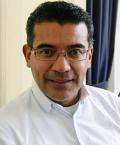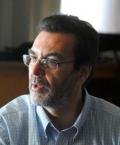An Advisory board, composed of members of diverse expertise crucial to TAI’s success informs TAI projects’ direction. The Advisory includes Michelle Schweisfurth (comparative and international education professor at Glasgow), Alison Phipps (UNESCO Chair in Refugee Integration through Languages and the Arts at Glasgow), Oha Orhan (cross-community arts practitioner at Mostar Music School) and Evelyn Arizpe (professor and GCRF Arts-based practices network leader at Glasgow).
Current network members in alphabetical order with biographical notes:
Alberto Cabedo-Mas is Associate Professor in Music and Education at University Jaume I (UJI), Castelló, Spain. He is Co-Director of the journal Eufonía: Didáctica de la Música and serves on the boards of several academic journals. His research interests include music education, musical heritage, coexistence, interculturality and the transmission of music across cultures.
Andrea Rodríguez-Sánchez is a social worker, musician and member of the Peace Program at the National University of Colombia. Her work focuses on peace building trough collective musical programs in Colombia and she is currently working for Batuta Foundation. She is a recent PhD graduate from the UNESCO Chair of Philosophy for Peace at the University Jaume I, Spain, where she was supervised by Alberto Cabedo-Mas and was a Visiting Scholar at University of Glasgow in the academic year 2015-2016.
Andrew Green is an anthropologist, ethnomusicologist, and popular music scholar, who works principally on Mexican music. He is Associate Professor at the University of Warsaw’s Faculty of Artes Liberales, having previously taught and researched at the University of Glasgow, University of the West of Scotland, and Royal Holloway, University of London.
Daniel Mateos-Moreno is a composer and Associate Professor in music education at the University of Malaga (Spain). Previously, he has held the position of Reader in music pedagogy at the University of Karlstad (Sweden) where he taught modules on managing conflict settings in music schools, among others. His areas of expertise include quantitative and qualitative methodologies for researching topics on music education, the psychology of music, and music therapy.
Deanna Yerichuk is Assistant Professor in the Faculty of Music at Wilfrid Laurier University, Canada, and coordinates the Bachelor of Music in Community Music. Her research focuses on historical and contemporary issues of inclusion and justice in cross-cultural collaborations through music. Deanna is Principal Investigator on two projects: The Gahu Project, combining music and racial justice; and Community Music in Canada, which explores participatory music projects working towards social justice within Canada.
Geoff Baker is Professor of Music at Royal Holloway, University of London, and Director of Research at the music charity Agrigento. He is the author of Imposing Harmony: Music and Society in Colonial Cuzco (Duke, 2008); Buena Vista in the Club: Rap, Reggaetón, and Revolution in Havana (Duke, 2011); El Sistema: Orchestrating Venezuela’s Youth (OUP, 2014); and Rethinking Social Action through Music (OBP, 2021). He made documentaries about music learning in Cuba and Venezuela (Growing into Music).
Gillian Howell is Dean’s Research Fellow at the Faculty of Fine Arts and Music, University of Melbourne, where she leads a portfolio of research examining the contributions of participatory music and arts to post-war peace and reconciliation. An award-winning community music leader and educator, she has worked in post-conflict music development projects in Bosnia-Herzegovina, Georgia, Sri Lanka and Timor-Leste, and led participatory composition projects with symphony orchestras, recently-arrived child migrants, and First Peoples in Australia.
Gloria Zapata-Restrepo is the UNESCO Chair in Arts, Education and Culture of Peace at Juan N. Corpas University Foundation, Colombia. She is the Director of their Master of Arts, Education and Peace Studies at University Foundation Juan N. Corpas, Colombia. Her areas of expertise include performing arts psychology and war-displaced children. With a doctorate on the effects of music on children’s socio-emotional development, she is currently Principal Investigator for the project ‘Artistic Identities of Ex-Combatants: Narratives, Education, Creation and Appropriation of Arts Practices for the Post-Peace Agreement in Colombia’.
Hector Vázquez is a doctoral graduate from the University of Victoria, Canada. He investigated how indigenous knowledge has been marginalised and excluded from music education in Mexico and how to (re)centre indigenous perspectives in education in Latin America. He recently published an article on this topic in the journal Action, Criticism and Theory for Music Education available at http://act.maydaygroup.org/act-18-3-vazquez-english/. His doctoral supervisor was Assistant Professor Anita Prest at the University of Victoria, Canada.
Educated in Northern Ireland (NI), Jenny Scharf taught music in England and in NI’s religiously segregated schools. She strongly believes in an education in and through music, achieved through creative processes. After contributing to the jurisdiction’s first statutory music curriculum (1992) she joined its Council for the Curriculum, Examinations and Assessment (CCEA) as principal officer for music.
Leeanne O’Hara has a background in applied psychology, a Masters in social research methods and a PhD from the School of Social Sciences, Education and Social Work at Queen’s University, which focused on social factors that influence substance use and anti-social behaviour in adolescence.
Liam O'Hare is a Principal Research Fellow within the School of Social Sciences, Education and Social Work at Queen's University Belfast. His research expertise is in the design, implementation and evaluation of evidence-based education programmes. He is Director of the Innovation Zones at Queen's University, which are partnerships between the university and two local communities in West Belfast facing disadvantage.
Lukas Pairon founded the international research platform SIMM (on Social Impacts of Music-Making) which since 2017 focusses on the development of research on social music programmes, in order to better understand what the role of music-making can be in social work. He is himself especially active in Gaza (Palestine) and in Kinshasa (DR Congo) with the philanthropic organisation Music Fund. In 2020 Routledge New York published his book ‘Music Saved Them, They Say’ on his research findings on social music in Kinshasa, DR Congo.
María Elisa Pinto is CEO of Prolongar Foundation, for which she leads operations and strategic direction, including national and local projects with conflict-affected population in Colombia through artsbased peacebuilding tools. She has directed numerous projects, including the first national report on landmines in Colombia, The Hidden War.
Mo Hume is Professor of Latin American Politics at the School of Social and Political Sciences, College of Social Sciences, University of Glasgow, UK. Her research focuses on how multiple and overlapping forms of violence are perceived by those who live in post-conflict contexts. She has carried out extensive fieldwork on protracted violence in Central America, and researched women’s perceptions of violence with an Oxfam America sponsored campaign to prevent gender violence.
Oscar Odena is Professor of Education at the School of Education and the School of Interdisciplinary Studies, College of Social Sciences, University of Glasgow, UK. Previously he held posts in Spain, England and Northern Ireland, where he completed a study on the potential of cross-community music activities to diminish ethnic tensions. His areas of expertise include qualitative research approaches, social inclusion, professional learning and music education. He is past Co-Chair of the ISME Research Commission 2012-2014.
Oscar Valiente is Professor of Education and International Development at the University of Glasgow. He is an expert on comparative education, skills, and international development. He has directed projects funded by the UK Economic and Social Research Council (ESRC), European Union, Scottish Funding Council, and Jaume Bofill Foundation.
Patricia A. González-Moreno is Professor of Music at the Autonomous University of Chihuahua, Mexico. Her areas of expertise include performing arts programs aimed at inclusion of disadvantaged children, music psychology, professional development in the arts, and digital technologies. Co-author of the global evaluation of El Sistema (with Creech et al, 2016). Currently working on the project ‘Educational processes for social inclusion in contexts of high vulnerability’, including a collaboration with University of Texas, to research and develop activities in contexts of violence.
Rubén Carrillo is a PhD student in the Doctorate in Education, Arts and Humanities, at the Autonomous University of Chihuahua. He holds a Master’s degree in Educational Innovation (2019) and a Bachelor’s degree in Music Education and Jazz Guitar Studies (2015). He has been a professional musician since 2008 and has worked as a freelance guitar player, composer and arranger in several musical events. He has also been musical director in projects of rock and videogame music.
Dr Sam Slatcher is a community music practitioner and Director of Citizen Songwriters, a social enterprise that brings isolated communities together through exploring music and lyrics. Sam combines participatory approaches to community engagement with his expertise on songwriting to facilitate group learning on music, songwriting and storytelling. In 2018, Sam completed his PhD in Human Geography from Durham University in creative arts-based approaches to community engagement in West Yorkshire.
Santiago Niño is a doctoral student at the University of Edinburgh, UK. His is investigating the identities of ex-combatant musicians active during the Colombian armed conflict that spanned over the last five decades. His doctoral supervisor is Professor Raymond MacDonald at the University of Edinburgh.
Sergio Figueiredo is a recently retired Associate Professor at the State University of Santa Catarina, Brazil. His research interests include music and teacher education, educational legislation and public policies. He is a member of the Boards of several international journals and was a member of the Music Evaluation Committee linked to the Ministry of Education in Brazil between 2005-2013.
Shelly Coyne is a researcher and musician working with singers who have experienced homelessness and their choirs and groups. She completed her PhD in 2020 looking at how singers give meaning to the experience of group singing participation as well as their music leaders, support staff and those who formed the singing groups.
Valeria Gascón is a passionate and driven PhD student from Mexico, currently studying at the University of Glasgow Glasgow. Her research focuses on the role of musical playlists as a means of expressing the experience of the Covid-19 lockdown in Mexico City connected with her own experience of the lockdown through an autoethnographic lens. She is interested in the ways music can be used to convey complex emotions and experiences.
Valeria Salinas-Maceda is Bolivian and an economist. Valeria earned her masters degree in Rural Development and is currently studying a PhD in the Economics Program at University of Salamanca. Valeria's research interests include cultural economy, indigenous leaderships, urban indigenous economies, indigenous women empowerment, creative industries, digital communities and social inclusion.


























